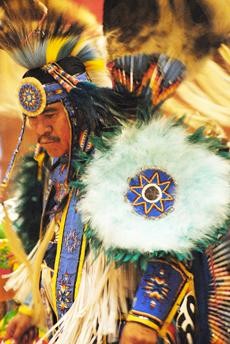Bad weather may have kept many people indoors this weekend, but it wasn’t enough to dampen the spirits of those attending the 14th Annual 2009 Wildcat Powwow.
The powwow was run and organized by the Wildcat Powwow Society, a student club on campus. The event April 10 and 11 brought together Native American students, community members and vendors from across the southwest for a celebration of traditional song, dance, art and food from several different Native American nations.
Originally scheduled to take place on Bear Down Field, the event was moved inside to Bear Down Gym because of the rain. But the change of venue was no impediment to the celebration.
“”We basically have dancers, they’re dancing for entertainment, prayer, blessings, it’s one of those cultural things,”” said environmental science freshman Tegan Cleveland, a volunteer with the Wildcat Powwow Society.
“”It’s mostly entertainment, but at the same time it’s sacred for the various tribes that are here. So we all come together once a year to watch,”” Cleveland said.
He said the main tribes represented at the event were Navajo, Sioux and Cherokee.
One of the highlights of the event was a Gourd Dance, a performance of songs and dances meant to pay homage to warriors. The term “”warriors”” indicates not just soldiers but also activists and other leaders, said Lee Jackson, president of the Southwest Gourd Society.
“”It’s basically a ceremony, as opposed to the powwow itself, which is basically social,”” Jackson said. “”The songs are all prayer songs about warriors. All men are warriors, but not all warriors have been to battle, in contemporary terms. We have warriors who fight for education, health, welfare and all these other things. These are wars being fought on different battlefields, and we embrace all these things.””
Apart from its social and spiritual value, the event also brings the local Native American community into the spotlight at a time when it is often overlooked, said political science junior Recynthia Robinson, president of the Wildcat Powwow Society.
“”(For many Native American students), coming to the UA is kind of a culture shock,”” Robinson said. “”We have a really small community here, and an event like this helps Native American students to adjust. It also helps with retention of Native American students as well.””
Linguistics junior Sylvia Islas agreed, adding, “”It’s important to know other people’s backgrounds and to understand where people come from. It’s really easy to just look over (the Native American community) and forget that they’re here, but this event is all about saying ‘Hey, we’re still here, come check us out.'””
Jewelry vendor Jerry Strongheart of Patagonia, Ariz., said he encourages people of all ethnicities to attend powwows so they can see Native American culture first-hand.
“”It’s all about being human,”” Strongheart said. “”It’s not about blood or lineage, it’s about what’s in your heart.””









